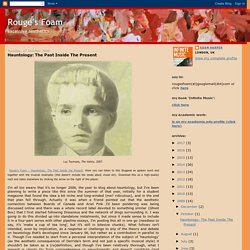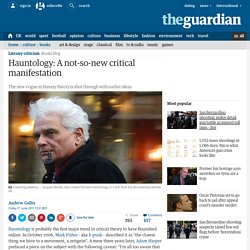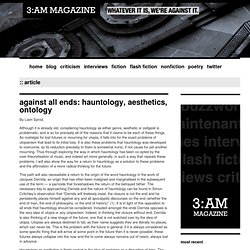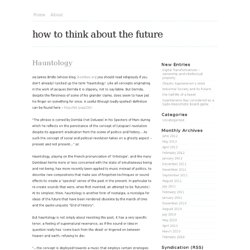

The hauntological society; Hauntology: The Past Inside The Present. Luc Tuymans, The Valley, 2007.

Rouge's Foam - Hauntology: The Past Inside the Present. Here you can listen to this blogpost as spoken word and together with the musical examples (this doesn't include the areas about visual art). Download this as a high-quality mp3 and listen elsewhere by clicking the arrow on the right of the player.I’m all too aware that it’s no longer 2006, the year to blog about hauntology, but I’ve been planning to write a piece like this since the summer of that year, initially for a student magazine that found the idea a bit niche and long-winded (me? Ridiculous), and in the end that plan fell through. Actually it was when a friend pointed out that the aesthetic connection between Boards of Canada and Ariel Pink I’d been pondering was being discussed online and there was a whole record label devoted to something similar (Ghost Box) that I first started following Dissensus and the network of blogs surrounding it.
What is hauntology? A hauntological effect in art. Hauntology: A not-so-new critical manifestation. Hauntology is probably the first major trend in critical theory to have flourished online.

In October 2006, Mark Fisher - aka k-punk - described it as "the closest thing we have to a movement, a zeitgeist". A mere three years later, Adam Harper prefaced a piece on the subject with the following caveat: "I'm all too aware that it's no longer 2006, the year to blog about hauntology". Two months ago, James Bridle predicted that the concept was "about six months away from becoming the title of a column in a Sunday supplement magazine".
Only four months to go, then. My hunch is that hauntology is already haunting itself. Like its close relative psychogeography, hauntology originated in France but struck a chord on this side of the Channel. As a reflection of the zeitgeist, hauntology is, above all, the product of a time which is seriously "out of joint" (Hamlet is one of Derrida's crucial points of reference in Spectres of Marx).
Against all ends: Hauntology, aesthetics, ontology. By Liam Sprod.

Although it is already old, considering hauntology as either genre, aesthetic or zeitgeist is problematic; and is so for precisely all of the reasons that it claims to be each of these things. As nostalgia for lost futures or mourning for utopia, it falls into for the exact problems of utopianism that lead to its initial loss. It is also these problems that hauntology was developed to overcome, so its reduction precisely to them is somewhat ironic, if not cause for yet another mourning. Thus through exploring the way in which hauntology has been co-opted by the over-theoretisation of music, and indeed art more generally, in such a way that repeats these problems, I will also show the way for a return to hauntology as a solution to these problems and the affirmation of a more radical thinking for the future.
Hauntology — how to think about the future. Via James Bridle (whose blog, booktwo.org you should read religiously if you don’t already) I picked up the term ‘hauntology’.

Like all concepts originating in the work of Jacques Derrida it is slippery, not to say labile. But Derrida, despite the flimsiness of some of his grander claims, does seem to have put his finger on something for once. A useful (though badly-spelled) definition can be found here – “The phrase is coined by Derrida (not Delueze) in his Specters of Marx during which he reflects on the persistance of the concept of (utopian) revolution despite its apparent eradication from the scene of politics and history… As such the concept of social and political revolution takes on a ghostly aspect – present and not present…” sic But hauntology is not simply about revisiting the past, it has a very specific tenor, a feeling of supernatural revenance, as if the sound or idea in question really has ‘come back from the dead’ or lingered on between heaven and earth, refusing to die: